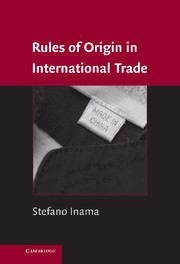Book contents
- Frontmatter
- Contents
- List of Figures
- List of Tables
- List of Acronyms
- Preface
- 1 Efforts to Establish Multilateral Rules
- 2 The Uruguay Round Agreement on Rules of Origin: The Harmonization Work Program of Nonpreferential Rules of Origin
- 3 Preferential Rules of Origin
- 4 The Economics of Rules of Origin
- 5 Drafting Preferential Rules of Origin
- 6 The Administration of Rules of Origin
- Index
- Frontmatter
- Contents
- List of Figures
- List of Tables
- List of Acronyms
- Preface
- 1 Efforts to Establish Multilateral Rules
- 2 The Uruguay Round Agreement on Rules of Origin: The Harmonization Work Program of Nonpreferential Rules of Origin
- 3 Preferential Rules of Origin
- 4 The Economics of Rules of Origin
- 5 Drafting Preferential Rules of Origin
- 6 The Administration of Rules of Origin
- Index
Summary
As I start writing the preface to this book, my mind goes back to the late 1980s, when technical issues on rules of origin began to arise from the surge of exports of the “Asian Tigers” and the trade defense mechanisms by the European Community (EC) and United States. The issue was mainly related to the alleged circumvention of such trade defense mechanisms in which manufacturers affected by the antidumping (AD) investigations relocated some working or processing operations in neighboring countries or directly in the export market. This move was counteracted by origin findings of the EC and the United States that indicated that the product exported from the neighboring countries or manufactured in their territory was in fact subject to only minimal working or processing, resulting in the product's having the same origin of the product subject to AD duties.
These were the times when rules of origin started to make headlines in the press. The trading community and AD lawyers were suddenly interested in origin issues. I quickly realized that rules of origin were an ideal issue for contention because they provided the grounds for arbitrary or discretionary practices under the cover of technical and obscure details. Only a select few were part of these early developments. Hardly any international rule, convention, or multilateral instrument could provide guidance to these initial debates.
- Type
- Chapter
- Information
- Rules of Origin in International Trade , pp. xxv - xxviPublisher: Cambridge University PressPrint publication year: 2009



